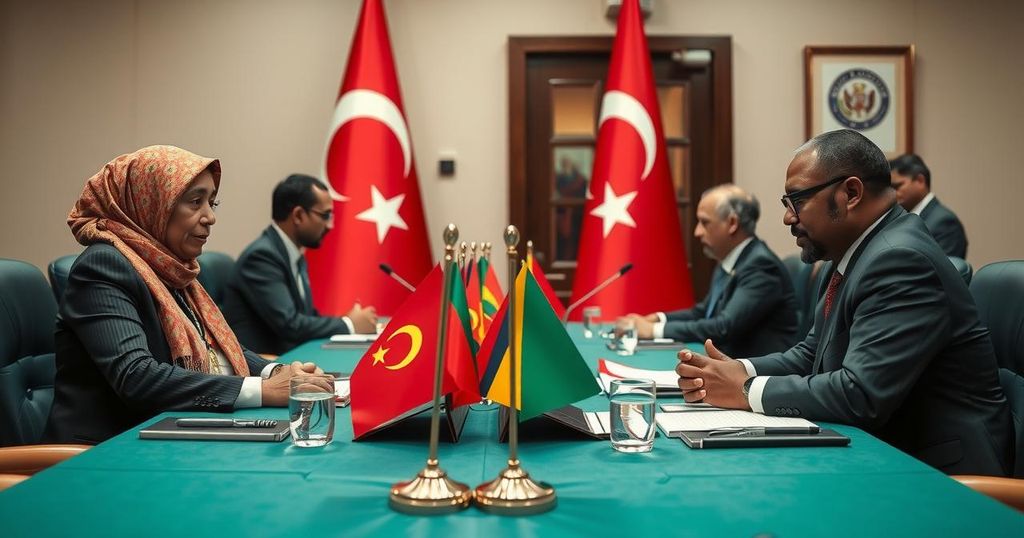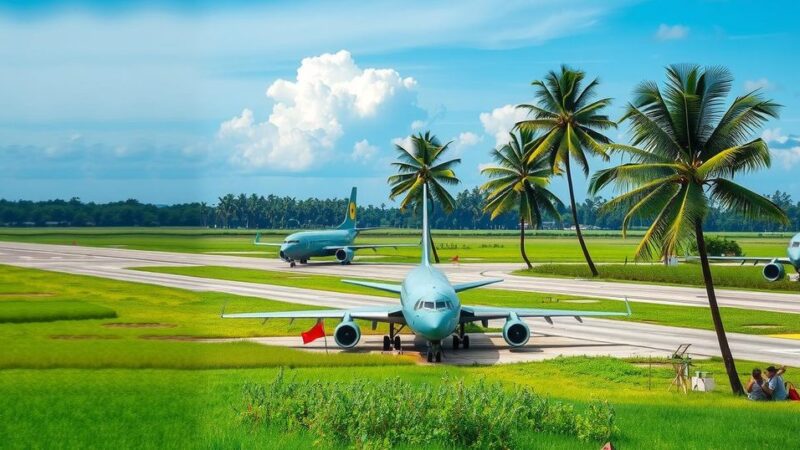Turkey is set to host talks between Somali President Mohamud and Ethiopian Prime Minister Ahmed to address port access disputes. Tensions have risen following Ethiopia’s naval agreement with Somaliland. Turkey has engaged with both nations to enhance Somali naval capabilities and strengthen diplomatic ties, with potential access negotiations on the table.
Turkey is preparing to facilitate discussions between Somali President Hassan Sheikh Mohamud and Ethiopian Prime Minister Abiy Ahmed this week, aiming to address a prolonged dispute regarding Ethiopia’s access to maritime ports in the Horn of Africa. Reports from Somali media indicate that President Mohamud is anticipated to engage in direct discussions with Prime Minister Ahmed during this diplomatic visit. While the Turkish Foreign Ministry has not commented on the matter, the Ethiopian embassy in Ankara also refrained from providing remarks. This meeting follows Ethiopia’s earlier naval agreement with Somaliland, which Somalia interprets as an encroachment on its sovereignty.
The escalating tensions triggered a significant response from Ankara, which has solidified its political and security partnership with Somalia by endorsing a comprehensive naval pact. This agreement reportedly includes provisions for the formation of a Somali navy and measures to safeguard Somali territorial waters against external threats, alongside the establishment of an energy collaboration, reflected in the recent deployment of Turkish energy drilling vessels along the Somali coast.
Relations between Ethiopia and Somalia have been fraught with challenges, exemplified by Somali officials threatening military action should the naval agreement with Somaliland be enforced. Turkey has previously hosted two rounds of diplomatic discussions between the two nations earlier this year, with Turkish officials announcing in August that notable progress had been achieved. Notably, Turkey’s security ties with Ethiopia have strengthened due to the sale of drones to the Ethiopian military, enhancing its capabilities amid the civil conflict against the Tigray forces.
Speculation in Ankara suggests that the upcoming meeting between Mohamud and Ahmed may yield constructive outcomes, particularly considering prior discussions that hinted at Somalia potentially granting Ethiopia port access in exchange for a retraction of the naval agreement with Somaliland. Additionally, Somaliland’s recent presidential elections have altered the political landscape, with newly elected President Abdirahman Mohamed Abdullahi perceived to be less accommodating towards Prime Minister Ahmed than his predecessor.
If negotiations progress favorably, Turkish President Recep Tayyip Erdogan may play a pivotal role in steering the talks towards a successful resolution.
The diplomatic relationship between Ethiopia and Somalia has historically been characterized by tension, particularly regarding issues of sovereignty and territorial access. The recent naval agreement between Ethiopia and Somaliland has exacerbated these tensions, with Somalia perceiving it as a threat to its territorial integrity. Turkey has sought to position itself as a mediator, engaging both countries through multiple rounds of talks and establishing strong bilateral relations with Somalia. Turkey’s strategic interests in the region are underscored by its commitments to enhance Somalia’s naval capacity and safeguard its resources against external threats, fostering a comprehensive partnership.
In summary, Turkey’s upcoming discussions between Somali and Ethiopian leaders are critical in addressing longstanding maritime disputes and regional tensions. The outcome of these talks could lead to significant diplomatic advancements and alter the dynamic of relations among the involved nations. Given the complex nature of these discussions, the involvement of Turkish President Recep Tayyip Erdogan could be instrumental in achieving a consensus that respects Somali sovereignty while providing necessary maritime access to Ethiopia.
Original Source: www.middleeasteye.net






